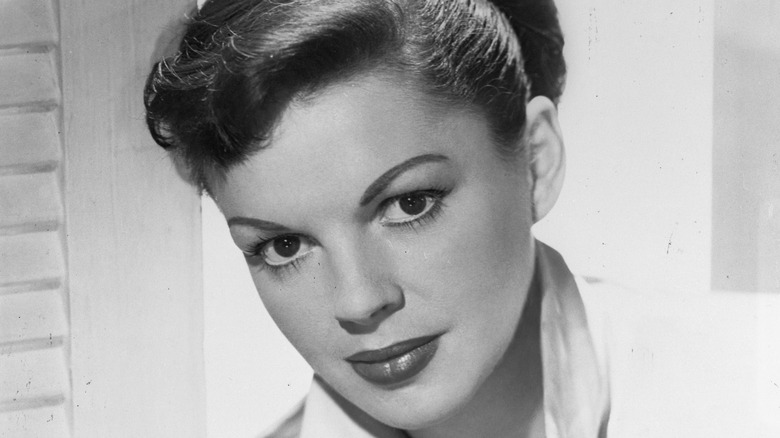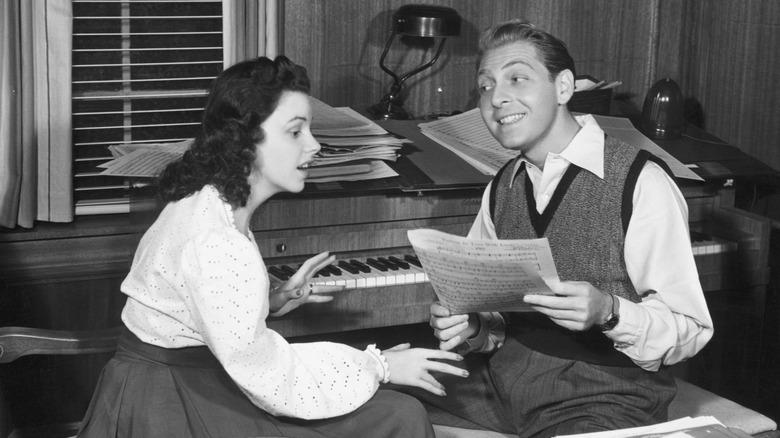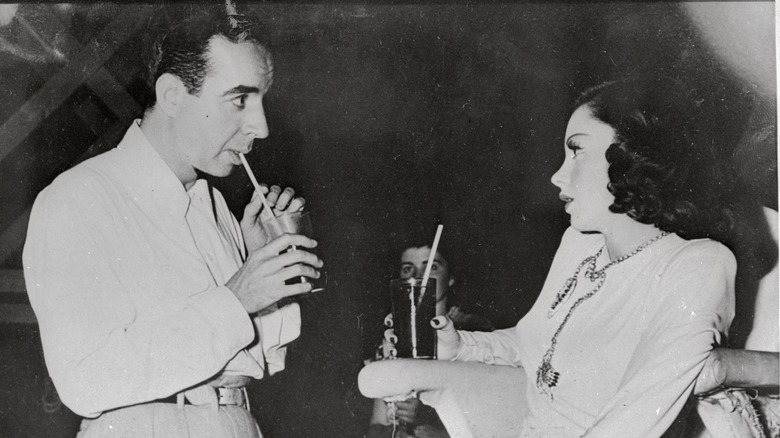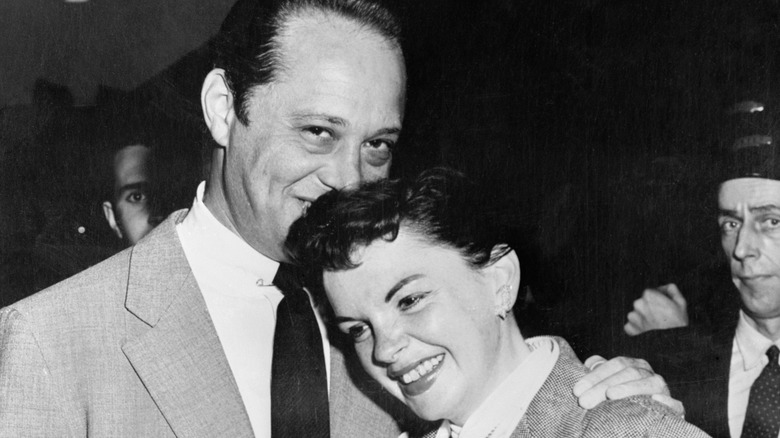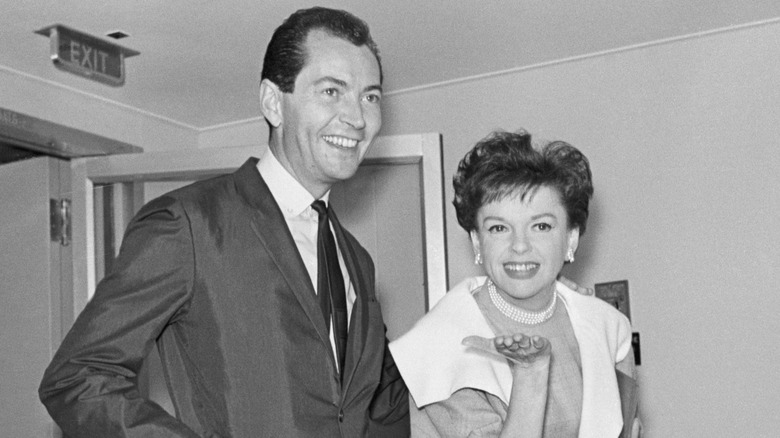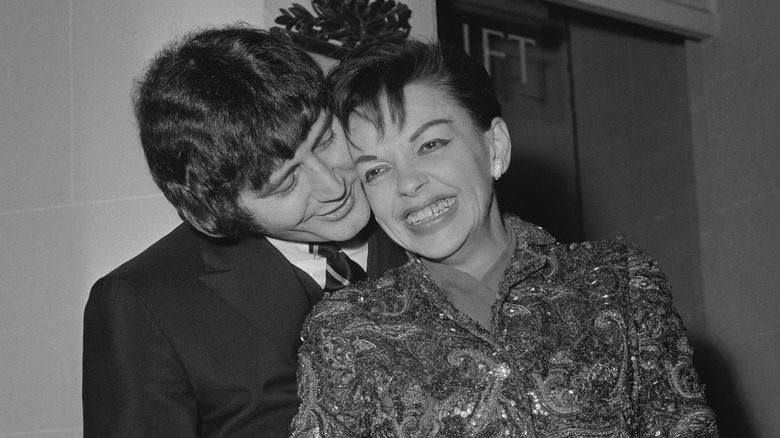A Closer Look At Judy Garland's Relationships With All Five Husbands
We may receive a commission on purchases made from links.
Judy Garland is a Hollywood legend, and we continue to watch — and rewatch — her iconic performances more than 50 years after her death. While she's forever connected with her iconic rendition of the song "Over the Rainbow" in the 1939 classic "The Wizard of Oz," she didn't find a happy ever after ending offscreen. Garland's real life was tragic and tumultuous. MGM, her employer, brought her professional acclaim while simultaneously providing multiple drugs that would lead to a lifelong struggle with addiction. Garland had worked for the studio starting at age 13, and as she grew to adulthood, MGM played an ongoing role in her personal life as she contemplated marriage.
"I do like to be in love," Garland once remarked, per Architectural Digest. "A woman is incomplete when she's not in love." She was in love with love, and when one love affair ended, the actor was ready to try again. "People don't realize that my mother was the most positive person," Lorna Luft, Garland's youngest daughter told Closer Weekly. "She used to say, 'Always remember that the glass is half-full."
With marriages that ranged from a few months to over a decade, Garland's search for love led to relationships with five very different men.
If you or anyone you know needs help with addiction issues, visit the Substance Abuse and Mental Health Services Administration website or contact SAMHSA's National Helpline at 1-800-662-HELP (4357).
Judy Garland and David Rose dealt with marital interference
Hollywood composer David Rose got to know Judy Garland when he was commissioned to craft some music for the star. His romance with her had an inauspicious beginning. The couple got engaged while Rose was still married to actor Martha Raye. Their wedding was delayed until he had been divorced for a year, at MGM's request.
This wasn't the end of demands from Garland's employer. Studio boss Louis B. Mayer infantilized 19-year-old Garland, calling her "that baby," and worried she wouldn't be a lucrative prospect as a grown-up, married woman. Garland's mother wasn't thrilled either, since her older daughters were unhappily married to musicians at the time. However, she did show her support by throwing an engagement party. Despite Garland's intention to have a lavish ceremony, she and Rose ended up having impromptu nuptials in Las Vegas.
Rose and Garland had very different personalities. A railroad aficionado, the composer loved riding on the scaled-down train on their property. He was more of an introvert, while in contrast, Garland was a social butterfly who loved to go out for the evening and dance. The couple grew farther apart when Garland became pregnant and Rose didn't share her enthusiasm about parenthood. Garland's mother threw in her two cents and, along with Rose, coerced Garland into getting an abortion. The damage to their marriage was irreparable, and after three years, Garland and Rose went their separate ways.
Vincente Minnelli and Judy Garland had a strong working connection, initially
Judy Garland met Vincente Minnelli when he directed her in the iconic film "Meet Me in St. Louis." While it wasn't love at first sight, Garland admired Minnelli's talent for accentuating her onscreen appearance. When they decided to get married, MGM head Louis B. Mayer approved as he believed it was a sound business decision. Garland's studio contract was due to expire in two years, and Mayer hoped he could persuade her to stay if she married the MGM director. In June 1945, a week after her divorce from David Rose was final, Mayer gave her away at the ceremony and financed the couple's three-month honeymoon.
In March 1946, Garland and Minnelli's daughter, future actor and singer Liza Minnelli, was born. Garland likely experienced postpartum depression at the time, and her mental health worsened after she resumed acting. The couple's marriage also splintered as both Garland and Minnelli had affairs, and Garland decided she didn't want to work with him due to her mental health. The actor engineered the director's dismissal from "Easter Parade," a musical in which she starred with Fred Astaire.
As Garland continued to deal with drug addiction and mental health difficulties, it affected her relationship with Minnelli. According to Gerald Clarke's "Get Happy: The Life of Judy Garland," Minnelli claimed she told him she wasn't trying to recover, something which he believed wasn't forgivable. By the end of 1950, Minnelli and Garland's marriage ended, and MGM dissolved her contract.
If you or someone you know needs help with mental health issues, contact the Crisis Text Line by texting HOME to 741741, call the National Alliance on Mental Illness helpline at 1-800-950-NAMI (6264), or visit the National Institute of Mental Health website.
Sid Luft helped Judy Garland reboot her career
Before he became a movie producer, Sid Luft met Judy Garland when she was 15 and working with his then-girlfriend, Eleanor Powell. In 1950, Luft and Garland started a romance when both of them were ending their marriages. Luft used his ingenuity to take Garland's career in a new direction, one that wasn't dependent on MGM. "She was so incredibly talented that I knew she could land on her feet if she had some help," he explained to The Telegraph in 2001. Luft focused on Garland's singing prowess and booked her for sold-out live shows in London and New York. When Garland got pregnant before their divorces were final, Luft advocated abortion. While he later wrote, "I was as unjustified as I was insensitive," in "Judy and I," (via The New Yorker), at the time he was convinced the out-of-wedlock pregnancy would jettison Garland's career.
Luft and Garland married in 1952, and had two children, Lorna and Joey Luft. Once again, Garland experienced postpartum depression, and she continued to struggle with drug addiction issues and her mental health. Although the couple was married for 13 years, during the final three years they had very little contact with one another, despite still living together. During divorce proceedings, Garland accused Luft of domestic abuse.
Luft maintained lifelong feelings for his ex-wife. "Whatever bad things happened, you don't fall out of love with somebody like her," he reminisced to The Telegraph in 2001.
If you or someone you know is dealing with domestic abuse, call the National Domestic Violence Hotline at 1−800−799−7233 or visit their website.
Judy Garland and Mark Herron had many ceremonies, brief marriage
A fellow actor as well as a producer, Mark Herron made a professional connection with Judy Garland by producing her London stage shows in 1964. Liza Minnelli sang with her mom, and Garland was a supportive co-performer. "If I [got] frightened, I'd look at her, and she would somehow know, and she would calm me down. Just by her look," Minnelli recalled on CBS Sunday Morning in 2022. Garland could empathize with her oldest child, as she had experienced anxiety attacks prior to live performances.
With Herron, a new romance bloomed for Garland before her divorce proceedings were wrapped up. As a result, she and Herron had multiple ceremonies. In June 1964, Garland divulged they got married aboard a ship near Hong Kong and had a second ceremony in her hotel. The couple traveled to Las Vegas in 1965 for a final ceremony after Garland's divorce was complete.
Besides being a whirlwind courtship, it was also a whirlwind marriage. Five months after their trip to Vegas, Herron and Garland were already separated, although it would take until 1967 until they divorced. Similar to her court appearance for her divorce from Sid Luft, Garland alleged that she had experienced domestic abuse in her fourth marriage. Herron contested her testimony and claimed he "only hit her in self-defense," per Los Angeles Times.
Judy Garland's family didn't approve of Mickey Deans
Judy Garland's struggles with substance addiction continued for the rest of her life and inadvertently led to Garland meeting her final husband, Mickey Deans. A musician and disco manager, Deans met the legendary actor when a friend requested that he deliver amphetamines to her hotel. After years of dating, Garland and Deans got married in 1969. According to Gerald Clarke's "Get Happy: The Life of Judy Garland," the singer was over the moon, claiming, "For the first time in my life, I am really happy. Finally, finally, I am loved," (via Vanity Fair). Her family, however, was much less enthusiastic. In her memoir, "Me and My Shadows," Lorna Luft recalled her half-sister, Liza Minnelli, sending her regrets with the quip, "I can't make it, Mamma, but I promise I'll come to your next one!" (via The Wrap).
Deans and Garland were married only three months when she died due to a barbiturate overdose. Although Garland's death was deemed an accident, Luft held Deans responsible, asserting he left too many drugs within Garland's reach. Luft was further angered by Deans' timing with regard to writing a book about her mom. "Mickey had arranged to stop by on the way back from my mother's funeral to cut a deal on a Judy Garland biography," Luft wrote in her memoir (via The Wrap). Deans' book, "Weep No More, My Lady," was eventually published in 1972. "Needless to say, I didn't buy a copy," Luft wrote. "Mickey Deans. What a putz."
